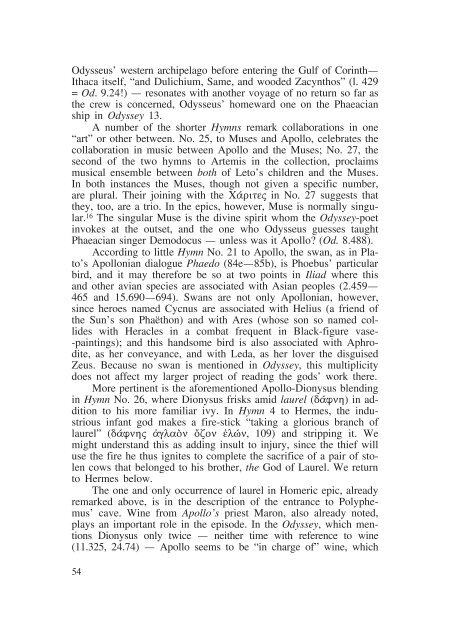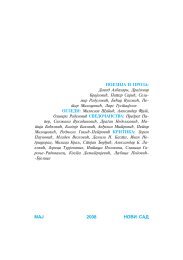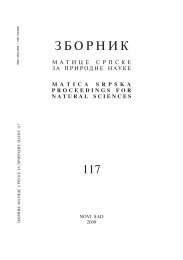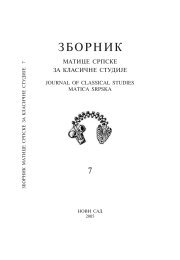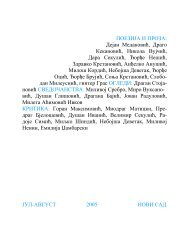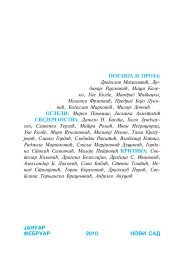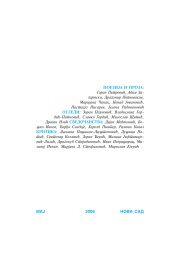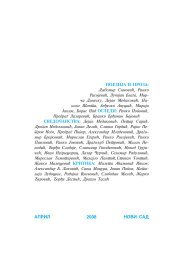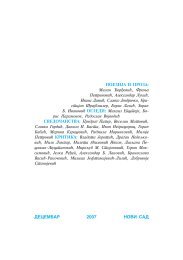You also want an ePaper? Increase the reach of your titles
YUMPU automatically turns print PDFs into web optimized ePapers that Google loves.
Odysseus' western archipelago before entering the Gulf of Corinth—<br />
Ithaca itself, “and Dulichium, Same, and wooded Zacynthos" (l. 429<br />
= Od. 9.24!) — resonates with another voyage of no return so far as<br />
the crew is concerned, Odysseus' homeward one on the Phaeacian<br />
ship in Odyssey 13.<br />
A number of the shorter Hymns remark collaborations in one<br />
“art" or other between. No. 25, to Muses and Apollo, celebrates the<br />
collaboration in music between Apollo and the Muses; No. 27, the<br />
second of the two hymns to Artemis in the collection, proclaims<br />
musical ensemble between both of Leto's children and the Muses.<br />
In both instances the Muses, though not given a specific number,<br />
are plural. Their joining with the XÀritej in No. 27 suggests that<br />
they, too, are a trio. In the epics, however, Muse is normally singular.<br />
16 The singular Muse is the divine spirit whom the Odyssey-poet<br />
invokes at the outset, and the one who Odysseus guesses taught<br />
Phaeacian singer Demodocus — unless was it Apollo? (Od. 8.488).<br />
According to little Hymn No. 21 to Apollo, the swan, as in Plato's<br />
Apollonian dialogue Phaedo (84e—85b), is Phoebus' particular<br />
bird, and it may therefore be so at two points in Iliad where this<br />
and other avian species are associated with Asian peoples (2.459—<br />
465 and 15.690—694). Swans are not only Apollonian, however,<br />
since heroes named Cycnus are associated with Helius (a friend of<br />
the Sun's son Phaëthon) and with Ares (whose son so named collides<br />
with Heracles in a combat frequent in Black-figure vase-<br />
-paintings); and this handsome bird is also associated with Aphrodite,<br />
as her conveyance, and with Leda, as her lover the disguised<br />
Zeus. Because no swan is mentioned in Odyssey, this multiplicity<br />
does not affect my larger project of reading the gods' work there.<br />
More pertinent is the aforementioned Apollo-Dionysus blending<br />
in Hymn No. 26, where Dionysus frisks amid laurel (dÀcnh) inaddition<br />
to his more familiar ivy. In Hymn 4 to Hermes, the industrious<br />
infant god makes a fire-stick “taking a glorious branch of<br />
laurel" (dÀcnhj ÈglaÁn Ózon Ñl3n, 109) and stripping it. We<br />
might understand this as adding insult to injury, since the thief will<br />
use the fire he thus ignites to complete the sacrifice of a pair of stolen<br />
cows that belonged to his brother, the God of Laurel. We return<br />
to Hermes below.<br />
The one and only occurrence of laurel in Homeric epic, already<br />
remarked above, is in the description of the entrance to Polyphemus'<br />
cave. Wine from Apollo's priest Maron, also already noted,<br />
plays an important role in the episode. In the Odyssey, which mentions<br />
Dionysus only twice — neither time with reference to wine<br />
(11.325, 24.74) — Apollo seems to be “in charge of" wine, which<br />
54


